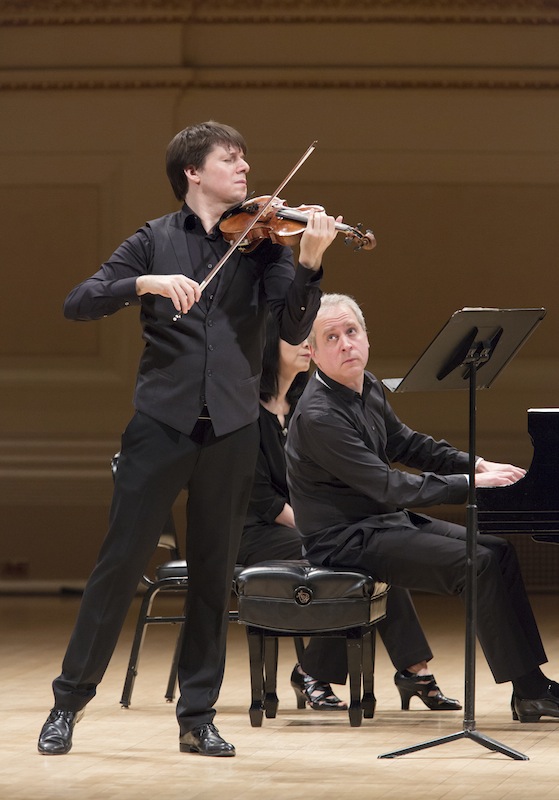Joshua Bell shows, again, why he is one of the fiddle greats

Joshua Bell and Jeremy Denk performed Wednesday night at Carnegie Hall. Photo: Jennifer Taylor
Wednesday night at Carnegie Hall brought the annual Isaac Stern Memorial Concert, paying tribute to the man who, more than anyone else, saved Carnegie Hall from the wrecking ball of urban “renewal” and who served as its first and only president.
Less it be forgot, Stern was also a pretty damn good fiddle player with a unique and longterm public profile, including being the hands that played John Garfield’s violin in Humoresque. The honor of honoring his legacy fell to another pretty damn good fiddle player, Joshua Bell, joined by pianist Jeremy Denk.
Bell played wonderfully all evening. His main virtue, an elegant style full of long, singing phrases, never becomes tiresome or out of fashion. He’s simply one of the best there is.
That style always sounds refreshing and can make a convincing argument in every kind of music. Denk’s own manner–fundamentally heroic, driving toward something profound– didn’t work with everything on the program.
The main problem came with the first piece, Mozart’s Violin Sonata in B-flat Major Sonata, K. 454. Bell’s playing was as sweet and warm as can be, the cantabile style of Mozart blooming through his violin—not unlike Stern. His phrases were full of little flashes of wit in the attacks and at the ends.
Denk couldn’t match Bell’s agility and articulation in the fast unison passages, as in the Allegro of the first movement. He also seemed to be fighting Mozart as much as playing him. Not only was the pianist uncomfortably heavy handed and percussive, there was little legato to be found. The performance felt a bit bizarre, with Bell sounding like a teacher leading his student through a dress rehearsal.
The other pieces were much more successful, fully integrated and well chosen to suit both players.
Richard Strauss’s Violin Sonata, Op. 18, is cast in the same heroic style of his orchestral tone poems, from the leaping, fanfare like opening statement. Denk was more in his element here, Bell especially so. The music is narratively lyrical and often, even in the Allegro movement, full of Strauss’ ssilken pleasures. Bell did not treat this gently, playing with a driving fervor, a Beethovenian storming-the-heavens virtuosity.
This put the secondary theme into strong relief, as did Bell’s humble manner in the second movement. The grit that Bell added to Strauss’s colorings made this a more exciting and deeper experience than one would have expected from this infrequently played work. Denk’s playing was properly energetic and responsive.
The last two pieces were played continuously. Before they began, Bell took the microphone to describe the implications of war in the quiet conclusion of Leoš Janáček’s Violin Sonata and the equally quiet opening of Schubert’s C Major Fantasy, D. 934.
Setting each off against the other worked well for both. The Janáček sonata is a masterpiece, another reminder that the composer is one of the 20th century’s giants, and far from a regional eccentric. The compelling turmoil in the music is one collection of private thoughts, while the Fantasy is something of the pluperfect salon piece. It doesn’t look inward so much as look between a very small, and close, group of people.
War and peace, or at least war’s aftermath, was a handy way to think about the performance. But the playing was so fine that it went further and deeper than the stated metaphor.
Bell was tremendous, singing as always, but so much more. Janáček’s melodic writing has the heavy influence of the consonants and rhythms of the Czech language, and is full of explosions of passion, quick asides, little throaty sounds, all articulated with great flexibility and naturalness by Bell. Even more than Mozart, Janáček sounded like the ideal composer for his playing.
His playing in the Fantasy was lithe and bright. Depending on personal values, one may have slightly regretted the letdown from the sheer impact of Janáček’s music to the lighter Schubert. But the Fantasy and the encore, Clara Schumann’s lovely Romance, had the two musicians in their closest coordination, and sent everyone home happy.
Violinist Anne-Sophie Mutter and pianist Lambert Orkis play Previn, Bach, Brahms, and Penderecki, 2 p.m. March 4. carnegiehall.org
Posted Feb 08, 2018 at 11:08 pm by KMW
Interesting review. To me Jeremy Denk made this performance. I’ve heard Bell w/o Denk. Much prefer this collaboration, as it apparently energized the violinist. Plus Denk’s ability to communicate form and harmonic change.